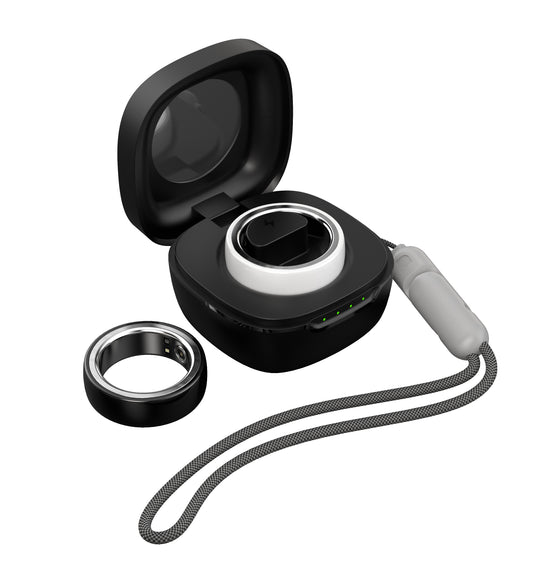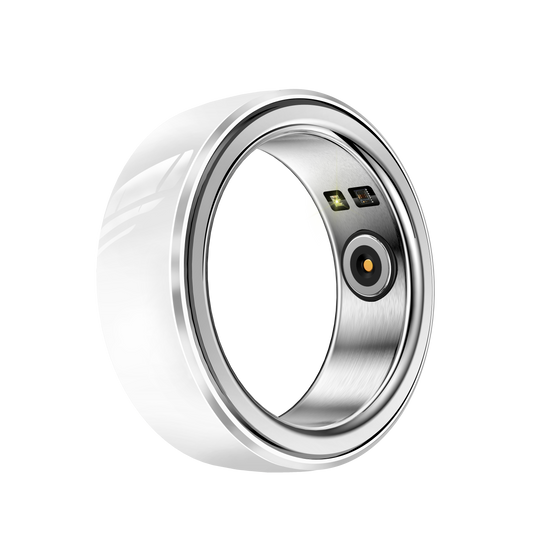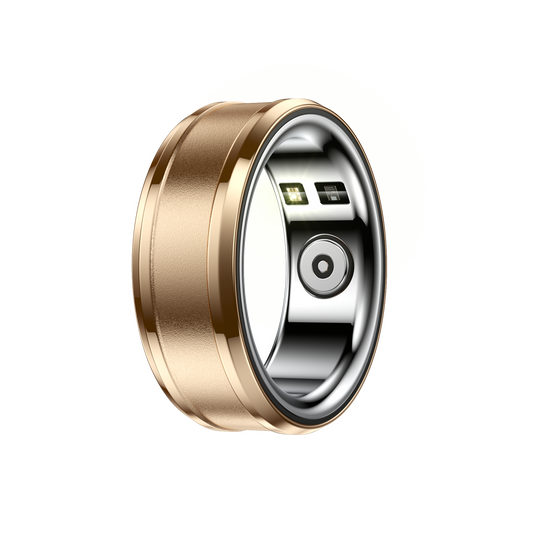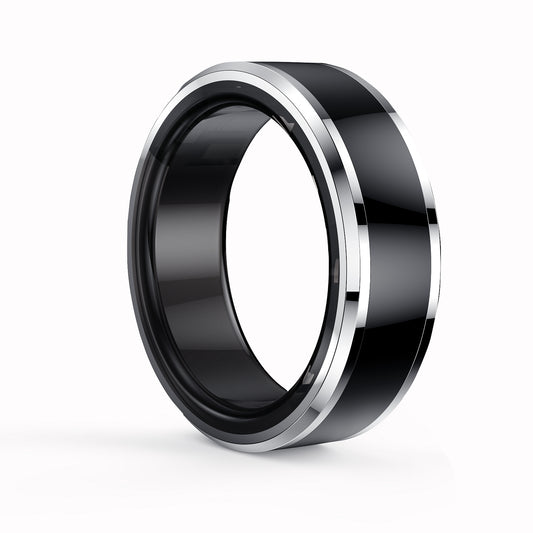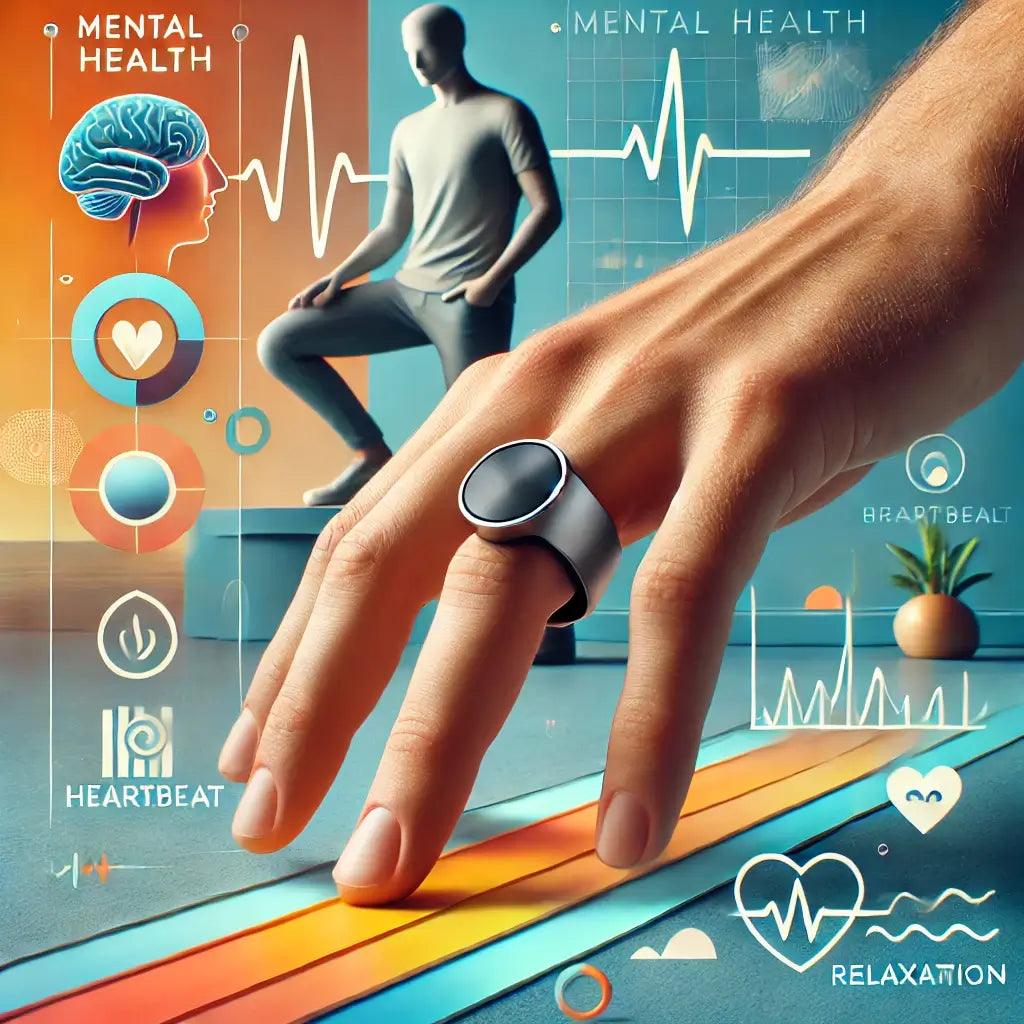
How Smart Rings Can Help Manage Stress and Mental Health
Share
In today's fast-paced life, managing stress and taking care of our mental health have become a priority for many of us. Stress and mental health problems can have a serious impact on our physical health, relationships and overall well-being. That's why more and more people are looking for effective tools to help them monitor and manage stress.
One of the latest trends in wearable technology are smart rings - intelligent rings that, thanks to advanced health monitoring functions, can support us in everyday management of stress and mental health. Smart rings collect and analyze data on our heart rate, heart rate variability (HRV), sleep quality and other health parameters, providing personalized recommendations and information that can help improve our well-being.
The purpose of this article is to present the benefits of using smart rings in managing stress and mental health. We'll look at how these devices can help detect problems, track progress and provide personalized advice, and discuss expert opinions and the future of this innovative technology.
How smart rings monitor stress and mental health
Description of technologies used in smart rings
Smart rings are technologically advanced devices that use various sensors and algorithms to monitor various aspects of our health. Thanks to the combination of miniaturization and advanced technology, smart rings can provide accurate and current information about our mental health and stress levels.
The most important technologies used in smart rings are:
- Optical sensors : Use light to monitor your heart rate by measuring changes in blood volume in your blood vessels.
- Accelerometers : Track the user's movements, which allows for analysis of physical activity and sleep patterns.
- Skin conductance sensors : Measures electrodermal activity, which can indicate stress levels.
- Heart Rate Variability (HRV) Analysis : Heart rate variability is one of the key indicators of stress and mental health.
Types of data collected by smart rings
Smart rings collect a wide range of data that helps monitor stress and mental health. Here are the most important data types:
-
Heart rate : Smart rings measure heart rate in real time, providing information on heart pulsation both at rest and during physical activity. Regular heart rate monitoring allows you to detect anomalies that may be related to stress or health problems.
-
HRV (Heart Rate Variability) : HRV is a measure of the variation in the intervals between successive heartbeats. Higher heart rate variability is usually associated with better mental health and lower levels of stress, while low HRV may indicate body overload or mental health problems.
-
Sleep quality : Smart rings monitor sleep patterns, recording light, deep and REM sleep stages. Analyzing this data helps you understand how sleep quality affects your mental health and stress levels.
-
Physical activity : Tracking your level of physical activity is crucial to understanding how exercise affects our well-being. Regular physical activity can help reduce stress and improve mental health.
-
Skin conductance sensors : These sensors measure skin responses to emotional stimuli, which can help assess stress levels.
Thanks to these advanced technologies and the wide range of data collected, smart rings offer a comprehensive tool for monitoring stress and mental health. This information can be used to detect problems early, track progress, and provide personalized recommendations to help manage everyday stress.
Benefits of monitoring stress and mental health with smart rings
Detect problems early
One of the key benefits of using smart rings is the ability to detect symptoms of stress and mental problems early. By continuously monitoring parameters such as heart rate, heart rate variability (HRV) and sleep quality, smart rings can provide valuable information about our health.
- Heart rate variability (HRV) : Low HRV can be an early indicator of chronic stress or mental health problems. Smart rings analyze HRV in real time, which allows you to quickly identify potential problems.
- Sleep patterns : Changes in the quality and duration of sleep may signal health or emotional problems. Smart rings track different sleep stages, helping to detect sleep disorders that are often associated with stress and mental problems.
- Heart rate : A high resting heart rate can be a sign of stress. Smart rings monitor your heart rate throughout the day, which allows you to identify disturbing patterns.
Track your progress
Regularly monitoring your mental health with smart rings allows you to track long-term changes and progress. This is especially useful for people who are working to improve their well-being and mental health.
- Health diaries : Smart rings often work with mobile apps that allow you to keep health diaries. Users can log how they feel, their stress levels and other relevant information, helping them track their progress over time.
- Reports and analysis : Mobile applications related to smart rings generate regular reports that analyze the data collected by the device. These reports can help identify trends such as improved sleep quality or reduced stress levels.
- Health Goals : Users can set mental health goals, such as increasing HRV or improving sleep quality. Smart rings provide current information on progress in achieving these goals, motivating you to take further action.
Personalized recommendations
Smart rings not only collect data, but also analyze it and provide personalized recommendations that can help manage stress and mental health.
- Sleep tips : By monitoring your sleep patterns, smart rings can provide tips on how to improve your sleep quality. These may include suggestions about bedtime, sleep duration, and conditions that promote better sleep.
- Relaxation exercises : Smart rings may suggest breathing, meditation or relaxation exercises that help reduce stress. These exercises are often tailored to the user's current health status, which increases their effectiveness.
- Physical activity : Regular physical activity is crucial for mental health. Smart rings can provide recommendations on the type and intensity of exercise that best suit the user's needs.
Monitoring stress and mental health with smart rings offers many benefits, from detecting problems early to tracking progress to providing personalized recommendations. Thanks to these advanced functions, smart rings become an invaluable tool supporting mental health and overall well-being.
Examples of using smart rings in everyday life
Examples of users who successfully manage stress and mental health with smart rings
Smart rings are becoming an increasingly popular tool for managing stress and mental health. Here are some examples of users who successfully use these devices in their daily lives:
-
Anna, corporate manager : Anna works in a stressful corporate environment where she is often faced with tight deadlines and a lot of responsibility. Thanks to her smart ring, Anna monitors her heart rate and HRV, which allows her to detect symptoms of stress early. When she notices that her HRV is low, she spends time doing breathing exercises and meditation to help her reduce stress. The app's health diaries help her track her progress and adapt her stress management strategies.
-
Marek, student : Marek is a student who struggles with anxiety and stress related to exams. Its smart ring monitors sleep quality and physical activity levels, providing recommendations for improving sleep routines and regular exercise. Thanks to this, Marek improved the quality of his sleep, which had a positive impact on his concentration and well-being. Regular reports help him understand how his actions affect his stress levels.
-
Zofia, a young mother : Zofia, as a young mother, often feels overwhelmed by household chores and child care. The smart ring helps her monitor her stress levels and sleep quality, providing personalized relaxation and time management tips. Thanks to regular relaxation exercises suggested by the smart ring, Zofia learned to manage stress better and found time to rest, which improved her mental health.
Case studies and anecdotes
Case 1: Improving sleep quality
Jan, a 45-year-old entrepreneur, noticed that his energy level was decreasing and his stress was increasing every day. He decided to buy a smart ring that monitored his heart rate and sleep quality. After a few weeks, he noticed that he was frequently waking up during the night, which was affecting his stress levels and productivity. Thanks to the analysis of data from the smart ring and personalized recommendations, Jan changed his habits, such as setting a fixed bedtime and avoiding screens before bed. After a month, his sleep quality improved significantly, which reduced his stress levels and increased his productivity.
Case 2: Managing stress at work
Kasia, working as a nurse, experienced high levels of stress associated with working in the intensive care unit. Her smart ring monitored her heart rate and HRV, providing her with data on her current health status. When HRV indicated a high level of stress, Kasia received notifications about the need for rest and suggestions for short relaxation exercises. These interventions allowed her to better manage stress and prevent burnout.
Case 3: Long-term improvement in mental health
Tomek, a 30-year-old programmer, struggled with long-term stress and anxiety. His smart ring not only monitored his heart rate and HRV, but also analyzed his sleep and physical activity patterns. Thanks to regular reports and personalized tips, Tomek introduced changes to his lifestyle, such as regular exercise and meditation techniques. After a few months, he noticed a significant improvement in his well-being and stress level.
These examples and case studies show how smart rings can be an effective tool in managing stress and mental health. Thanks to continuous monitoring, personalized recommendations and the ability to track progress, smart rings help users make positive changes in their lives, improving their well-being and mental health.
Expert opinions on using smart rings to manage stress
Quotes and opinions from mental health and technology professionals
Mental health and technology experts see great potential in smart rings for managing stress and mental health. Here are some opinions:
-
Dr. Anna Kowalska, clinical psychologist : "Smart rings are an extremely useful tool in monitoring and managing stress. Thanks to constant access to data on heart rate and heart rate variability (HRV), users can keep track of their reactions to stress and implement appropriate remedial actions. This "What used to require visits to specialists and complicated tests is now available at your fingertips."
-
Jan Nowak, wearable technology specialist : "Wearable technology, including smart rings, is the future of mental health monitoring. Smart rings offer precise and current data that is key to understanding how our daily habits affect our stress level. Integration of these devices with mobile applications that analyze this data and provide personalized recommendations, opens new opportunities for self-management of health.
-
Dr. Ewa Zielińska, psychiatrist : "Regular monitoring of heart rate variability (HRV) using smart rings can help in the early detection of problems related to stress and mental health. Users can better understand their body and mind, which is crucial for effective stress management. This tool "It also provides the opportunity to adapt therapeutic strategies based on real data."
Recommendations for best practices
Experts emphasize that in order to maximize the potential of smart rings in stress management, it is worth following several best practices:
-
Regular monitoring : Use the smart ring daily to collect complete data on heart rate, HRV, sleep quality and physical activity. Regularity is key to obtaining accurate and useful information.
-
Data analysis : Regularly review reports and analysis provided by smart ring-related apps. Understanding trends and patterns in your data will help you better manage stress and mental health.
-
Personalized actions : Use personalized recommendations provided by the smart ring. These may include suggestions for relaxation techniques, physical exercise, or changes to your sleep routine. Tailoring activities to individual needs increases the effectiveness of stress management.
-
Consultations with specialists : Although smart rings provide valuable data, they do not replace professional medical help. If necessary, consult your results with mental health professionals to get a more complete picture of your health and appropriate support.
-
Setting realistic goals : Set realistic goals related to your mental health and stress levels. Tracking your progress will help you stay motivated and make positive changes in your life.
-
Education and awareness : Be aware of how smart rings work and what data they collect. Education about wearable technology and its capabilities increases the effectiveness of using these devices.
Thanks to these practices, smart rings can become an invaluable tool in everyday stress and mental health management. Combined with the knowledge of specialists and modern technologies, users can significantly improve their well-being and quality of life.
The future of wearable technology in the context of mental health
New technologies and innovations in smart rings
Wearable technology, including smart rings, is developing at a breakneck pace, introducing new solutions that can significantly impact mental health management. Here are some of the latest technologies and innovations that are changing the way we take care of our mental health:
-
Advanced biometric sensors : New generations of smart rings are equipped with even more precise biometric sensors that can monitor a variety of health parameters such as heart rate variability (HRV), stress levels, sleep quality and physical activity. This allows users to obtain more detailed and accurate information about their health condition.
-
Artificial intelligence (AI) and machine learning : Integration of AI and machine learning in smart rings allows for more advanced data analysis. AI algorithms can predict and detect stress patterns and suggest personalized mental health management strategies. Thanks to continuous learning, these systems become more and more precise and effective.
-
Biofeedback : Smart rings are starting to use biofeedback technology, which allows users to constantly observe their body's reactions to various stimuli and actions. Biofeedback can help you learn relaxation techniques and improve self-control, which is crucial for managing stress and mental health.
-
Haptic Technologies : Innovations in haptic technology allow smart rings to provide subtle vibrations as a form of communication and reminders. They can serve as signals to perform breathing exercises, meditation or other relaxation techniques, which helps in real-time stress management.
Anticipated trends and developments in this field
The future of wearable technology in the context of mental health looks extremely promising. Here are some of the expected trends and development directions:
-
Personalization and individualization : Smart rings will be increasingly tailored to the individual needs of users. Personalized health programs tailored to specific stress and mental health patterns will become the standard.
-
Integration with health ecosystems : Smart rings will increasingly integrate with other health devices and applications, creating comprehensive health management ecosystems. This will allow users to track their mental health in the context of their overall health, allowing for a more holistic approach to stress management.
-
Increased awareness and education : With the growing popularity of smart rings, public awareness about stress management and mental health will also increase. Educational campaigns and access to health resources will help users better understand how to use wearable technology in their daily lives.
-
Developments in sensor technology : Future generations of smart rings will be equipped with even more advanced sensors that will be able to monitor new aspects of mental health, such as neurotransmitter levels and changes in brain activity. This will open up new possibilities in the diagnosis and treatment of mental problems.
-
Social support : Integrating social features into smart ring-related applications will enable users to share their experiences, support each other and participate in online support groups. Social support is crucial to mental health, and technology can help build stronger connections and support networks.
In summary, the future of wearable technology in the context of mental health is full of innovation and opportunity. Smart rings, thanks to their advanced functions and integration with modern technologies, can become an integral part of our everyday life, helping us better manage stress and take care of our mental health.
Summary
Key conclusions
Smart rings are becoming an increasingly popular tool for managing stress and mental health. Thanks to advanced technologies such as biometric sensors, artificial intelligence and biofeedback, smart rings offer precise monitoring and analysis of data regarding our health. Regularly tracking your heart rate, heart rate variability (HRV), sleep quality and physical activity level allows you to detect problems early, track progress and provide personalized recommendations.
Examples of users such as corporate managers, students and young mothers show how smart rings can help manage everyday stress and improve mental health. Mental health experts emphasize that smart rings can be an extremely effective tool in health monitoring, providing valuable data and recommendations.
Encouragement to use smart rings in everyday stress and mental health management
If you are looking for effective ways to manage stress and take care of your mental health, smart rings may be the perfect solution for you. Thanks to them, you can monitor your health on an ongoing basis, track your progress and use personalized advice that will help you make positive changes in your life.
We encourage you to try smart rings and discover how these advanced devices can support your daily stress management. Tracking your heart rate, HRV, sleep quality and physical activity allows you to better understand your body and mind, which is key to effectively managing stress and mental health.
The future of wearable technology looks extremely promising, and smart rings are at the forefront of this revolution. Investing in your mental and physical health is one of the best decisions you can make. With smart rings, you have a tool to help you on this journey. Get started today and experience the benefits of modern technology in managing stress and mental health.
FAQ
1. How do smart rings help with stress management? Smart rings monitor health parameters such as heart rate, heart rate variability (HRV) and sleep quality. By analyzing this data, they can provide personalized recommendations and tips on stress management, such as relaxation techniques and breathing exercises.
2. What data do smart rings collect? Smart rings collect data on heart rate, HRV, sleep quality, physical activity and sometimes skin conductance, which can indicate stress levels.
3. Are smart rings safe to use? Yes, smart rings are safe to use. The data collected by these devices is typically encrypted and stored securely, minimizing the risk of unauthorized access.
4. Can smart rings help detect mental health problems? Smart rings can help detect symptoms of stress and mental health problems early by monitoring parameters such as HRV and sleep quality. Regularly tracking this data allows you to identify disturbing patterns.
5. What are the best practices for using smart rings? To make the most of the potential of smart rings, it is worth regularly monitoring your health parameters, analyzing reports and personalized recommendations, and consulting mental health specialists if necessary.
6. Are smart rings suitable for everyone? Smart rings can be used by people of different ages and levels of physical activity. They are especially useful for people who want to monitor their health, manage stress and improve sleep quality.
7. What technologies are used in smart rings? Smart rings use advanced technologies such as optical sensors to monitor heart rate, accelerometers to track physical activity, and AI to analyze data and provide personalized recommendations.
8. Do smart rings require regular calibration? Smart rings do not usually require regular calibration, but it is important to make sure they are fitted correctly and fit well to ensure accurate measurements.
9. How long does the battery in smart rings last? Battery life in smart rings may vary depending on the model, but is usually from a few days to a week. It is important to charge your device regularly to ensure continuous operation.
10. Where can I buy smart rings? Smart rings can be purchased on the InnoWearTech website and in other reputable wearable technology stores. We encourage you to familiarize yourself with our offer and choose the smart ring that best suits your needs.
